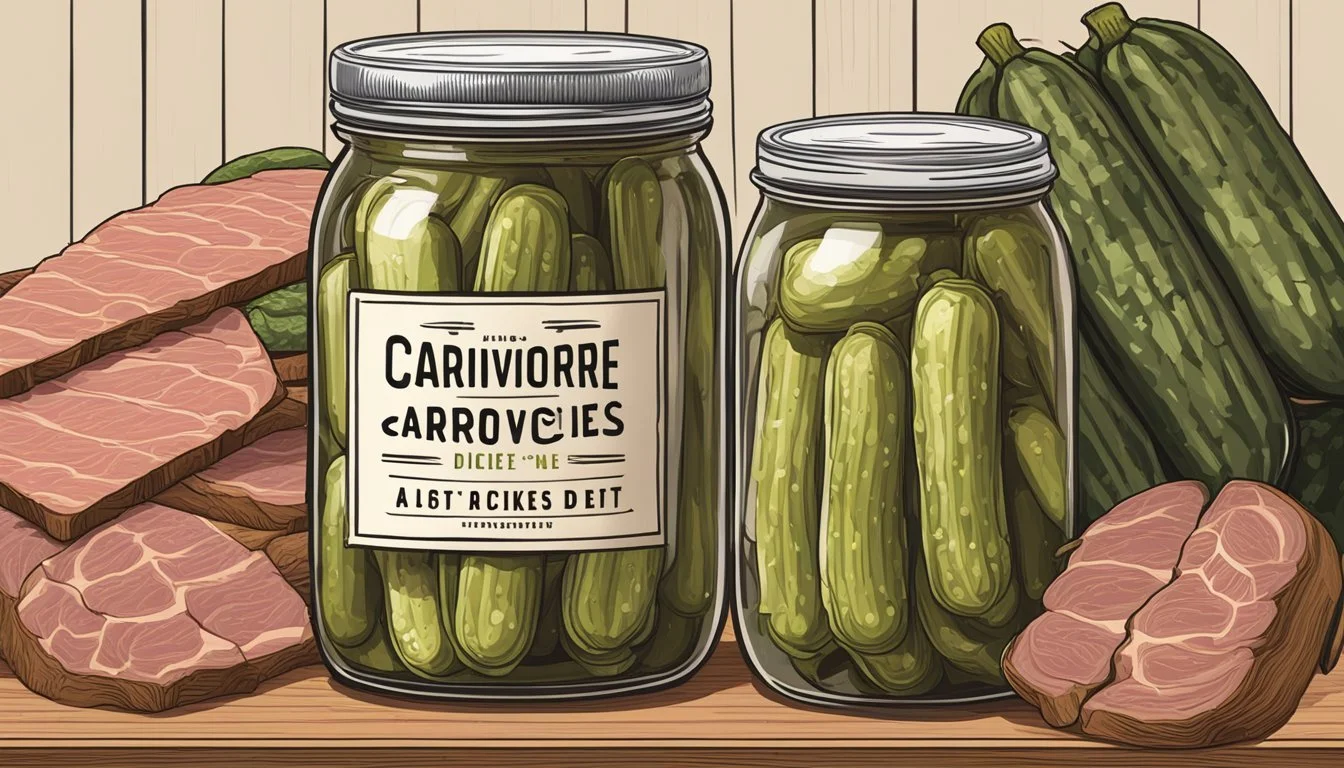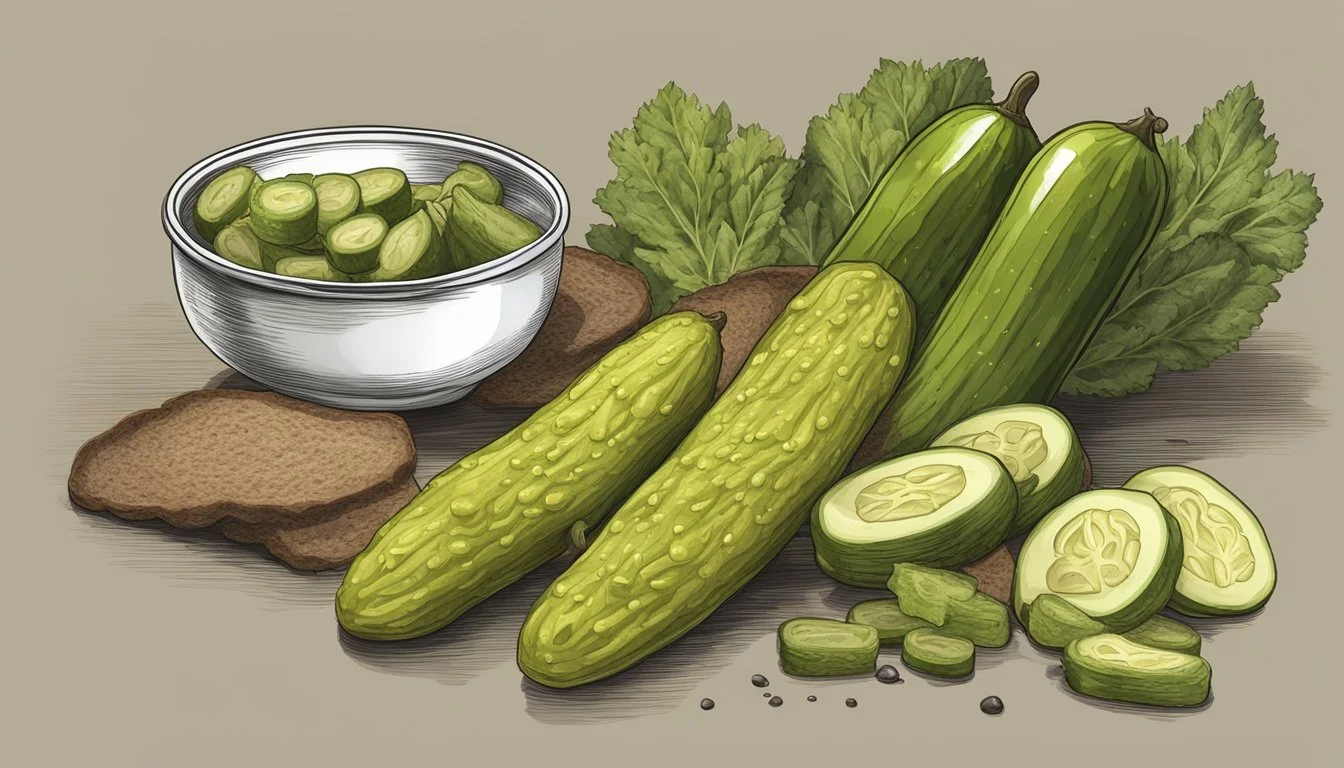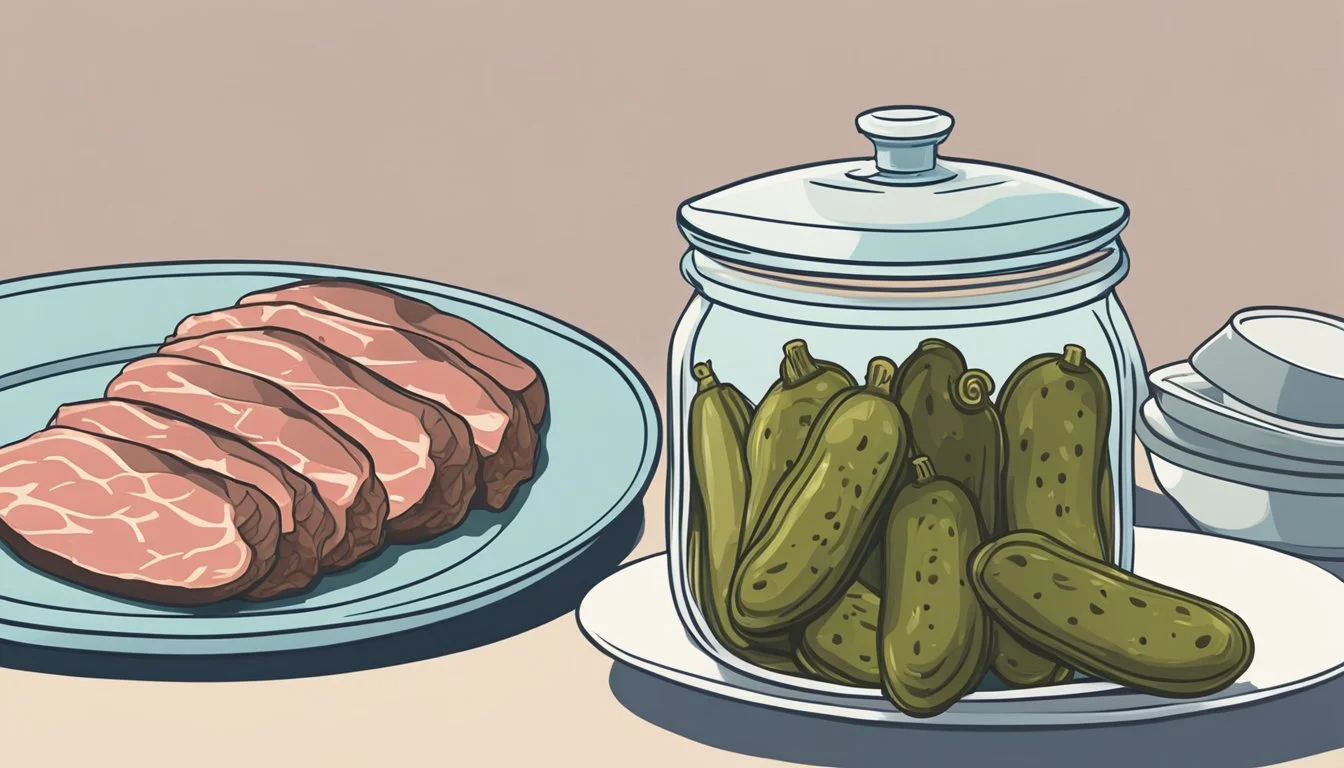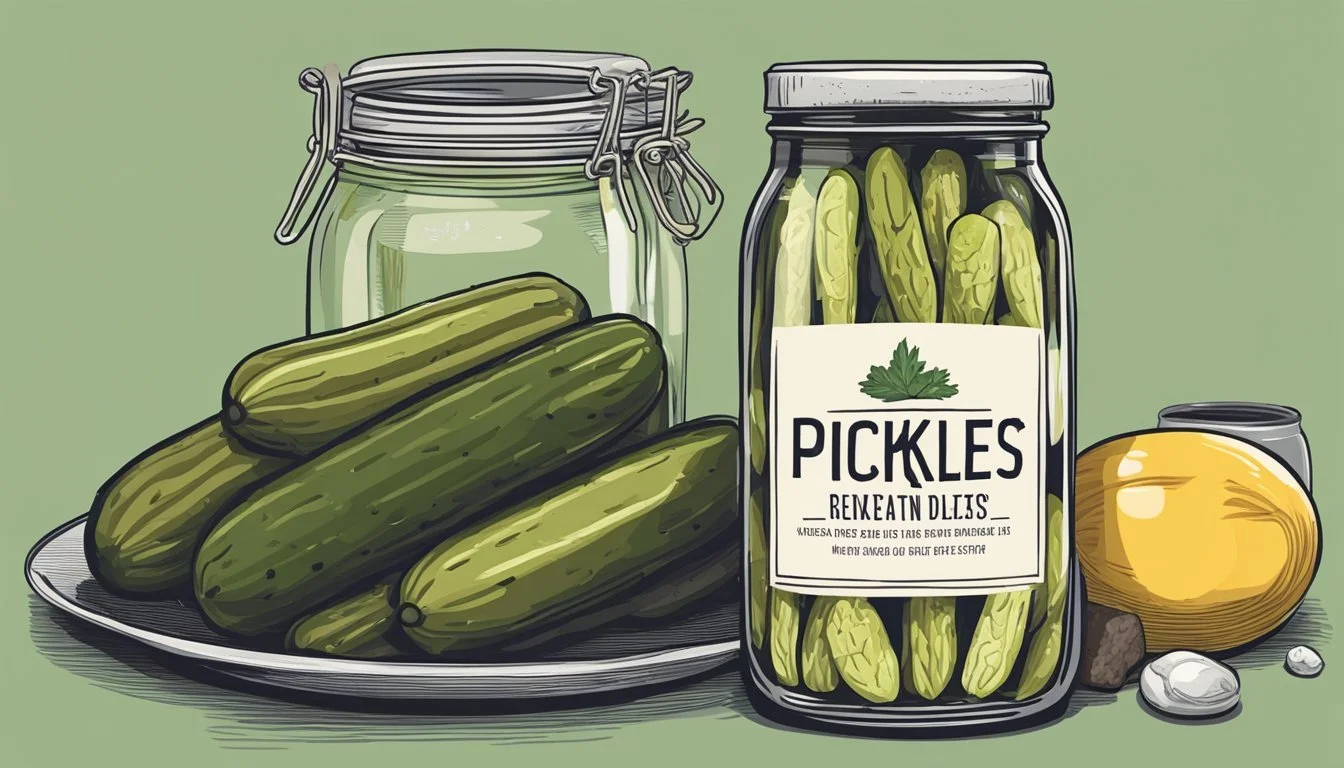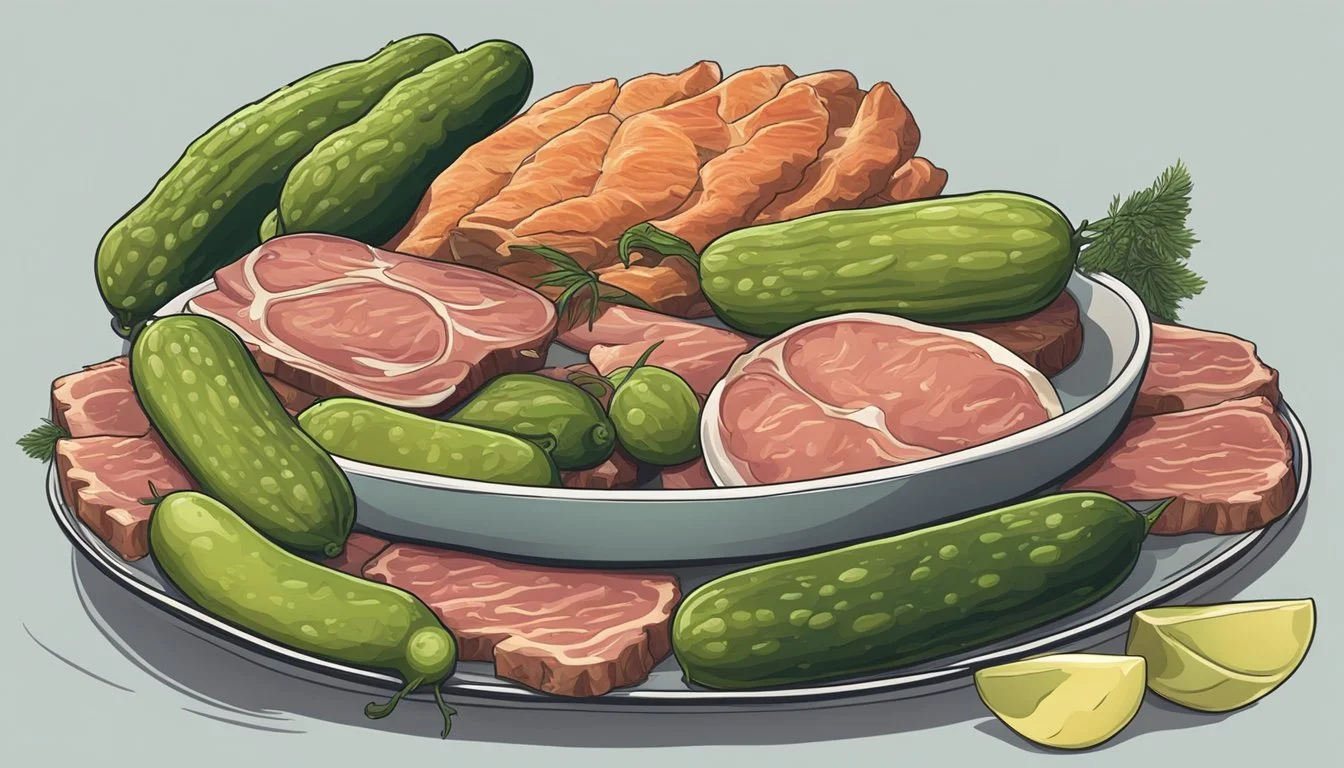Pickles on Carnivore Diet
Are They Suitable Inclusions?
The carnivore diet, which emphasizes the consumption of animal products to the exclusion of plant-based foods, has gathered a following among those seeking various health benefits and simplicity in their eating habits. It typically consists of meats, fish, eggs, and select dairy products. As proponents focus on these food groups, questions arise regarding the inclusion of certain foods that do not fit neatly into the categorization, such as pickles.
Pickles, known for their tangy flavor and crunch, are cucumbers that have been fermented in a brine solution of water, salt, vinegar, and seasonings. While cucumbers are vegetables, the fermentation process transforms them into a food that is distinct from their raw state. The debate centers on whether the modified nature of pickles allows them to be a part of the carnivore diet, or whether their origin as a plant-based food automatically excludes them.
Advocates of a more flexible carnivore approach may include pickles due to their minimal carbohydrate content and probiotic qualities. However, others adhering to a strict interpretation argue that any plant-based food, regardless of its form, should be avoided to remain true to the diet's principles. Individuals considering pickles on a carnivore diet must weigh the benefits against potential deviations from the diet's strict guidelines.
Understanding the Carnivore Diet
The Carnivore Diet is notable for its exclusive focus on animal-based foods and avoidance of plant matter, aiming to provide essential nutrients predominantly through high-quality protein and fat sources.
Fundamentals of Carnivore Diet
The Carnivore Diet insists on the consumption of animal products exclusively, minimizing or eradicating plant-based foods. It centers around the premise that early humans thrived on a meat-dominated diet, suggesting that a modern iteration could offer similar health benefits. Proponents advocate for the diet’s simplicity and focus on protein-rich foods, which primarily include:
Meat: Beef, pork, lamb, wild game
Poultry: Chicken, turkey, duck
Fish: Especially fatty fish like salmon and mackerel for omega-3 fatty acids
Eggs: Heralded for their nutrient density
Dairy: High-fat products like butter and cheese
The diet also emphasizes the importance of consuming fat alongside protein for energy and nutrient absorption.
Health Benefits of Carnivore Diet
Adherents of the Carnivore Diet claim various health benefits stemming from its high protein and low carbohydrate profile. They cite an increase in muscle mass, due to the abundance of protein, and an improvement in satiety leading to potential weight loss. The diet may also supply essential vitamins and minerals predominantly found in animal foods, such as vitamin B12, iron, and zinc. Some experiences suggest that eliminating plant foods can reduce inflammation and alleviate symptoms of autoimmune conditions; however, these claims often come from anecdotal evidence rather than comprehensive studies.
Carnivore Diet Food List
The permitted food list for the Carnivore Diet is straightforward, comprised solely of animal-based foods. Here is a basic outline:
Meat:
Foods: All types, particularly organ meats for their nutrient density
Poultry:
Foods: Including all parts and types, with skin for added fat
Fish:
Foods: Encourage fatty varieties for their omega-3 content
Eggs:
Foods: Any form, but especially yolk-rich preparations
Dairy:
Foods: Primarily high-fat options like cheese and heavy cream
This diet restricts the intake of any and all plant-based foods, with some variations allowing for minimal exceptions like seasoning. It’s also critical for individuals to assess their nutrient intake to ensure they meet all their dietary needs, as certain vitamins, such as vitamins C and E, are less common in animal products.
The Role of Pickles in a Carnivore Diet
In evaluating the role of pickles in a carnivore diet, one must consider their nutritional value and the distinctions between homemade and store-bought variations.
Nutritional Value of Pickles
Pickles, primarily made from cucumbers, are known to contain vitamins and minerals; however, their presence in a carnivore diet is controversial due to the carbs and fiber they contain. The primary process used for creating pickles is fermentation, a method that can add probiotics that support gut health. Typically, fermentation requires salt, and sometimes spices and herbs, to encourage the proliferation of beneficial bacteria. Yet, the calories, carbohydrate content, and potential additives like vinegar or sugar found in some pickles clash with the low-carb, animal-focused ethos of a carnivore diet.
Nutrients in Fermented Pickles (per 100g):
Calories: 11
Carbohydrates: 2.26g
Fiber: 1.1g
Probiotics: Present due to fermentation
Homemade vs. Store-Bought Pickles
When assessing homemade pickles versus store-bought pickles, carnivore dieters should consider the presence of preservatives, sugars, and other plant-based additives that are often found in commercial products.
Homemade Pickles: They typically contain fewer additives and can be made with just cucumbers, salt, and water, aligning better with the diet's focus on minimal ingredients. Carnivore dieters may opt to prepare pickles at home to ensure the absence of sugars and vinegar.
Store-Bought Pickles: It is essential to scrutinize ingredients as they often include preservatives, stabilizers, and flavorings that do not fit the carnivore template. Not all commercial pickles are created equal; some may include acceptable ingredients, while many fall outside the carnivore diet's parameters.
Comparison of Homemade Pickles vs. Store-Bought Pickles
Preservatives:
Homemade Pickles: Absent
Store-Bought Pickles: May be present
Additives:
Homemade Pickles: Minimal
Store-Bought Pickles: Varies widely
Sugar:
Homemade Pickles: None (if made to carnivore diet specs)
Store-Bought Pickles: Commonly added
Control over Ingredients:
Homemade Pickles: Complete
Store-Bought Pickles: Limited
Choosing homemade pickles ensures control over the ingredients and the exclusion of non-carnivore substances, making them a potentially more suitable option for those strictly adhering to the diet's principles.
Potential Health Considerations
When considering the role of pickles in a carnivore diet, one must balance the potential health benefits with strict dietary compliance. This section examines how moderate consumption of pickles may impact health, particularly focusing on digestive benefits, while also discussing the possible effects on ketosis which is a cornerstone of the carnivore diet.
Incorporating Pickles Moderately
Pickles may offer variety and flavor in a carnivore diet, but they should be chosen carefully. Pickles devoid of added sugars and low in carbohydrates are preferable to maintain alignment with the diet’s principles. Consuming them in moderation is key to prevent unintentional intake of plant-based foods and excess carbohydrates which could disrupt dietary goals.
Pickles and Digestive Health
Pickles, especially those that are fermented, contain beneficial bacteria that can support gut health. They may aid in digestion and offer some advantages for hydration and blood pressure regulation due to their electrolyte content. However, this must be weighed against the fact that pickles are a plant-based food and their fiber content could potentially be at odds with the carnivore diet's stance on such foods.
Impact on Ketosis
The carnivore diet aims for a metabolic state called ketosis, where the body burns fat for fuel in the absence of dietary carbohydrates. Pickles with no sugars or carbohydrates may not interfere with ketosis, but one has to ensure that the total daily carbohydrate intake remains minimal. Any deviation, even minor, could potentially disrupt the state of ketosis, hindering weight loss and affecting mental clarity.
Nutritional Aspects of Pickles
In assessing pickles from a nutritional perspective, one shall focus on their content of vitamins and minerals as well as their role in hydration and electrolyte balance.
Vitamins and Minerals in Pickles
Pickles contain a limited profile of vitamins and minerals due to the fact that they are fermented cucumbers. Despite this, they have certain micronutrients which can contribute to daily dietary needs. Most notably, pickles can provide:
Vitamin C: Essential for immune function and skin health. The content of vitamin C in pickles is modest due to the fermentation process that may reduce its level.
Antioxidants: Fermented foods like pickles contain antioxidants which help in combating oxidative stress.
Minerals: Key minerals found in pickles include sodium, potassium, and magnesium, although in varying amounts depending on the method of preparation.
Online shopping for vitamin C, potassium, and magnesium is the smart choice for a seamless transaction!
Hydration and Electrolytes
Hydration is crucial for bodily function, and pickles can play a role in maintaining fluid balance due to their water content and electrolytes. Notable electrolytes in pickles include:
Sodium: An essential electrolyte that helps regulate fluid balance but is usually high in pickles, making them suitable for post-exercise recovery when sodium replenishment is required.
Potassium: Works in conjunction with sodium to maintain proper cell function and hydration.
Magnesium: Present in smaller amounts, it aids in muscle and nerve function.
It's important to consider that the brine solution used in pickling is high in sodium, which can contribute to increased salt intake. Consumers should consume pickles in moderation, especially if they are monitoring their sodium levels.
Considerations for Special Dietary Needs
The carnivore diet may need to be adjusted for individuals with certain health conditions, particularly those with allergies or autoimmune diseases.
Allergies and Sensitivities
Individuals with dietary allergies or sensitivities must exercise caution on the carnivore diet. Foods typically permitted, such as eggs and dairy, might trigger allergic reactions or sensitivities in some people. It is vital to identify and eliminate such foods to maintain health and comfort.
Eggs: A common allergen; may cause reactions like hives or gastrointestinal distress.
Dairy: Lactose intolerance or dairy protein sensitivity could lead to issues.
Seafood: Shellfish and certain fish may trigger severe allergic responses.
One must meticulously ensure that their meat choices do not cross-react with known allergens.
Autoimmune Protocols
For those with autoimmune conditions, following an autoimmune protocol (AIP) may be beneficial. This subset of the carnivore diet focusses on reducing inflammation and potentially autoimmune responses.
Meat: Opt for grass-fed and hormone-free to minimize potential triggers.
Offal: Rich in nutrients but should be sourced carefully to avoid exacerbating autoimmune symptoms.
Individuals should avoid processed meats and additives, as they can aggravate autoimmune responses. Close monitoring of dietary responses is crucial to manage symptoms effectively.
Aligning Pickles with Dietary Goals
When considering pickles on a carnivore diet, one must evaluate its impact on specific dietary objectives such as weight loss and mental clarity. The following subsections explore how pickles fit these goals.
Weight Loss and Body Composition
For individuals pursuing weight loss or aiming to alter their body composition, incorporating pickles should be done cautiously. Pickles often contain negligible calories, which might fit within a calorie-restricted plan. However, some are made with added sugars that can disrupt ketosis—a state beneficial for fat-burning, commonly targeted in a carnivore diet. It's crucial to select pickles without these additives.
Appropriate Pickle Choices for Weight Loss:
Sugar-free options
Minimal to no carbohydrate content
Natural fermentation without plant-based additives
Mental Clarity and Inflammation Control
The carnivore diet is often adopted for its potential benefits concerning mental clarity and inflammation control. Some individuals may find that fermented foods like pickles can contribute positively due to probiotics which could influence gut health. Nevertheless, there is a caveat; pickles containing non-carnivore ingredients like vinegar may counteract these benefits.
Pickle Consumption for Mental Clarity:
Prioritize naturally fermented pickles
Monitor reactions to ensure no adverse effects
Inflammation Response:
Avoid pickles with additives known to cause inflammation
Consume in moderation to prevent any potential inflammatory response
Culinary Uses of Pickles in Carnivore Diet
While the carnivore diet primarily focuses on animal products, the inclusion of pickles can add flavor and variety. It's essential to select pickles fermented in a brine solution without added sugars or plant-based additives.
Creative Ways to Include Pickles
Pickles can be more than just a tangy accompaniment to a meal. On a carnivore diet, they must be used sparingly and conscientiously. For instance:
As a condiment: Finely chopped pickles can be added to homemade carnivore-friendly sauces to provide a vinegary bite.
In recipes: Chopped pickles can be used to enhance the flavors in dishes like tartare or carnivore diet-friendly ceviche where vinegar or citrus typically features.
When incorporating pickles, remember the importance of maintaining the integrity of the diet by choosing options with few to no plant-based ingredients.
Pairing with Carnivore Diet Staples
Pairing pickles with the staples of the carnivore diet can satisfy the palate without straying from dietary constraints.
With meats: A slice of pickle can refresh the palate between bites of rich meats such as beef, bacon, or salami.
Alongside fat sources: Pickles can cut through the heaviness of fatty foods, creating a balance when eaten with foods high in fat like eggs or certain cuts of red meat.
For those who ferment their own meats, using a brine solution similar to that used for pickles could be an experimental avenue, preserving meat while imbuing it with subtle, tangy flavors characteristic of fermentation.
Debating the Fit of Pickles in Strict Carnivore Diets
The inclusion or exclusion of pickles in strict carnivore diets is a nuanced debate, hinging on the diet's foundational principles of zero carbohydrates and exclusive animal product consumption.
Zero-Carb Carnivore Considerations
Main Principle: The strict carnivore diet, or zero-carb diet, dictates the consumption of only animal products, eliminating all plant foods to maintain a state of ketosis.
Carbs in Pickles: Even though pickles come from cucumbers, which are a vegetable, the fermenting process that pickles undergo breaks down some carbohydrates. However, the final carbohydrate content is not zero.
Table 1: Nutritional Components of Concern in Pickles
Carbohydrates:
Strict Carnivore Diet: Not allowed
Pickles: Low but present
Fiber:
Strict Carnivore Diet: Not allowed
Pickles: Present
Added Flavors:
Strict Carnivore Diet: Not allowed
Pickles: Often present
Fermentation:
Strict Carnivore Diet: N/A
Pickles: Central to pickles
Evaluating the Purist Approach
Purist Rationale: Followers of an all-meat or strict carnivore diet avoid any intake of plant-derived foods, including seeds, nuts, legumes, grains, and vegetables, to maintain purity of the diet and to stay in ketosis.
Role of Ketosis: By strictly avoiding carbohydrate intake from sources like pickles, adherents believe they promote more stable blood sugar levels and effective fat-burning through sustained ketosis.
Dairy and Fermented Foods:
While the classic carnivore diet excludes plant foods, dairy, such as milk and certain cheeses, may be included for their nutritional benefits, despite containing some carbohydrates. The purist's argument is less about fermentation and more about sticking to animal products and maintaining ketosis by minimizing carbohydrate intake.
It is evident that while some less strict, low-carb diets may allow for the inclusion of pickles, the strict and zero-carb viewpoints of the carnivore diet typically do not.

